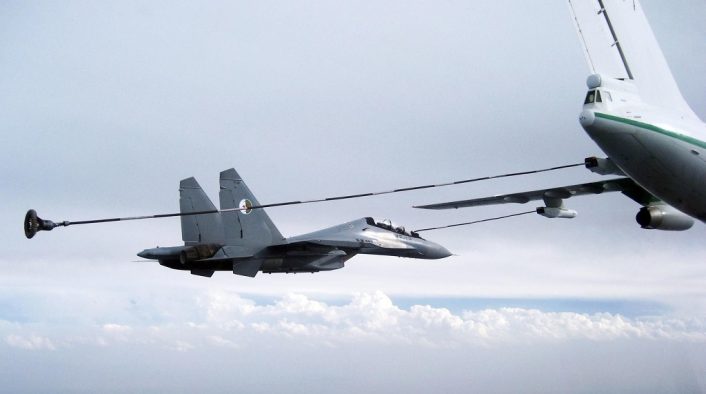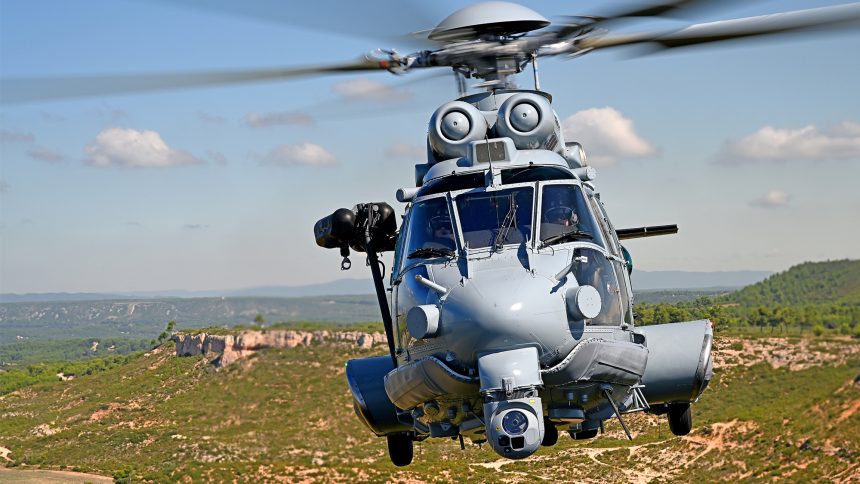Announced at the Dubai Air Show, 10 H225M helicopters will join the Royal Moroccan Air Force and begin to replace its ageing Puma fleet in the combat search and rescue role.
Joining over 360 H225 and H225M helicopters in service worldwide, Morocco’s ten examples of the aircraft will be fitted with Safran Euroflir 410 electro-optical/infrared (EO/IR) camera turrets, double hoists, and a searchlight. Crew-served weapons can be mounted for self-defence purposes, and the helicopters will also be equipped with an electronic warfare self-protection suite.
Though the H225M, previously known as the Eurocopter EC725, can trace its lineage through the AS532 Cougar back to the SA330 Puma that it will replace, the new aircraft is a massive leap forwards in terms of technology. Modern avionics, new engines with full authority digital engine control (FADEC), and a five blade composite main rotor allow for greater performance and easier operation while preserving much of the familiarity and function of the workhorse Puma design. The Royal Moroccan Air Force (RMAF) has now operated the original Puma for over forty years.
#Moroccan #AirForce 🇲🇦 #AfricanLion2025 🏜 Puma Transport / Logistic Helicopter #Morocco #Maroc pic.twitter.com/JFOFOW1hYJ
— ۞ Kingdom of Morocco Armies-جيوش المملكة المغربية (@KOMARMIES) May 25, 2025
“We are honoured that Morocco has chosen to replace its legacy Puma fleet with the H225M,” said Bruno Even, CEO of Airbus Helicopters. “This is another step in the partnership we have been building over the decades with the Kingdom of Morocco. The H225M is enjoying a strong momentum on the market. This aircraft is a reference for complex missions in tough environments. This order solidifies the H225M’s reputation as the helicopter of choice for combat search and rescue and special operations across the world.”
The H225/H225M family has amassed almost 980,000 flight hours worldwide, operating in military service with France, the Netherlands, Hungary, Brazil, Mexico, Singapore, Thailand, Malaysia, Indonesia, Iraq and Kuwait.
In the civilian world, the H225 is a popular choice for the demanding role of flying offshore oil and gas workers to their respective platforms, though a fatal crash in 2016 saw confidence in the helicopter shake. The type additionally serves with Coast Guard units in Iceland and Japan. In the latter, specially equipped H225s act as VIP transports in the Emperor’s Royal Flight.
Japan’s largest Super Puma operator @JCG_koho will expand its current #H225 fleet to 18. 🚁🇯🇵
The new H225s will be dedicated for maritime law enforcement, territorial coastal activities and rescue missions in Japan. ⚓️🛟 https://t.co/1SqONo71ZO
— Airbus Helicopters (@AirbusHeli) April 11, 2024
The RMAF currently has 24 Puma helicopters, so the new H225M order will not be enough for a like-for-like replacement. However, it is unknown how many of the RMAF’s Pumas are readily available for operations, so the delivery of new helicopters with higher availability may have been assessed as providing an equivalent capability. Alongside the Puma, Morocco flies the Airbus H135M, CH-47D Chinook, and various Bell models in the utility/transport role. The Royal Moroccan Navy’s helicopter fleet is split between the Bell 412 and the Airbus AS565 Panther.
In 2024, Airbus Helicopters revealed plans for the construction of a dedicated customer centre in Morocco which will accommodate the servicing of the variety of Airbus Helicopters-serviced types in Moroccan service. The manufacturer hopes that the facility will grow to become a major hub for maintenance, repair, and overhaul (MRO) of Airbus Helicopters products throughout West Africa.
Regional Disputes
Morocco’s relationship with neighbor and fellow West African nation Algeria has long been strained. In 2021, diplomatic relations between the two countries were withdrawn completely, with the Algerian President claiming their disputes had reached the “point of no return”. Many disagreements are related to the status of the Western Sahara territory, where Morocco contends against the Algeria-aligned Sahrawi Republic for sovereignty. The United Nations currently recognises Western Sahara as a non-self governing territory occupied by Morocco.
Algeria, a larger and more populous nation, boasts a strong armed forces that has bucked the international trend and leaned even closer to Russia following its 2022 full-scale invasion of Ukraine. The Algerian Air Force operates some of Russia’s latest aircraft designs, including the Su-30 and Su-35, and the nation has also long been rumored as the first overseas customer for both the Su-34 strike aircraft and fifth-generation Su-57. Though still operating a number of Western helicopter types, the bulk of Algeria’s helicopter fleet comes from Russian manufacturer Mil.

The Royal Moroccan Air Force, meanwhile, operates a modest fleet of 23 F-16 Fighting Falcons. As part of modernisation efforts, these are intended to be upgraded to a more modern standard, while 25 additional Block 70/72 jets are also planned. Morocco’s ties with the United States provides a level of protection, and it is classed by NATO as a major non-NATO ally.
Tensions between Morocco and Algeria, though currently still avoiding armed conflict, show little sign of improvement and many of those who monitor the region have attempted to draw attention to the potential flashpoint – describing it as akin to a rapidly brewing African Cold War.









